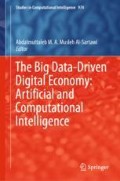Abstract
The study examined the Moodle system adoption by the students in three Gulf universities “Saudi Arabia, United Arab Emirates and Kingdom of Bahrain” and examines the students perceptions towards this system from the framework of two theories: The Theory of Reasoned Action (TRA) and the Theory of Planned behavior (TPB). This study is a descriptive survey research. The convenience sampling technique was adopted in the selection of 231 respondents from the sampled universities. The results revealed that the students used the Moodle system for many purposes such as: doing assignments, to check upcoming events, downloading the course materials and to participate in discussion with my instructors. The results also revealed that the most impactful perceived ease of use factors: easy usage, flexibility and interaction. Finally, the study is suggested to investigate academic concerns and needs to develop the usage of Moodle in Arabian and Gulf universities.
Access this chapter
Tax calculation will be finalised at checkout
Purchases are for personal use only
References
Alhothli NI (2015) Investigating the impact of using moodle as an e-learning tool for students in an english language institute. Un-Published Master Thesis, The University of Montana, the Graduate School at Scholar Works, p 21
Al-Sartawi A (2020) Social media disclosure of intellectual capital and firm value. Int J Learn Intellect Capital 17(4):312–323
Al-Sartawi A (2020) Does it pay to be socially responsible? Empirical evidence from the GCC countries. Int J Law Manage 62(5):381–394
Al-Sartawi A (2020) Information technology governance and cybersecurity at the board level. Int J Crit Infrastruct 16(2):150–161
Al-Sartawi A (2019) Assessing the relationship between information transparency through social media disclosure and firm value. Manage Acc Rev 18(2):1–20
Al-Sartawi A (2018) Ownership structure and intellectual capital: evidence from the GCC countries. Int J Learn Intellect Capital 15(3):277–291
Dharmendra C, Kumar C, Abhishek B, Soni CA (2011). Effective e-learning through moodle. Int J Adv Technol Eng Res (IJATER) 1(1):34–38
Costa C, Alvelos H, Teixeira L (2012). The use of Moodle e-learning platform: a study in a Portuguese University. In CENTERIS - Conference on ENTER prise Information Systems, pp 334–343
Prashant B, Londhe BR (2014). From teaching, learning to assessment: Moodle experience at b’school in India. In Symbiosis Institute of Management Studies Annual Research Conference (SIMSARC13), Procedia Economics and Finance 11, pp 857–865
Oproiu GC (2015). A study about using e-learning platform (moodle) in university teaching process. In The 6th international conference education world 2014 “education facing contemporary world issues”, 7th - 9th November 2014, Procedia - social and behavioral sciences 180, pp 426–432
Abdulrasool FE, Turnbull SI (2020) Exploring security, risk, and compliance driven IT governance model for universities: applied research based on the COBIT framework. Int J Electron Bank 2(3):237–265
Zainuddin N, Idrus R, Jamal AFM (2016). Moodle as an ODL teaching tool: a perspective of students and academics. Electron J e-Learning 14(4):282−290
Rymanova I, Baryshnikov N, Grishaeva A (2015). E-course based on the LMS moodle for english language teaching: development and implementation of results. In XV international conference “linguistic and cultural studies: traditions and innovations”, LKTI 2015, 9–11 November 2015, Tomsk, Russia, pp 236–240
Teo T, Zhou M, Fan AC, Huang F (2019). Factors that influence university students’ intention to use moodle: a study in macau, educational technology. Res Dev New York 67(3):749–766
Aliyu OA, Arasanmi C, Ekundayo S (2019). Do demographic characteristics moderate the acceptance and use of the Moodle learning system among business students? Int J Educ Dev Inf Commun Technol (IJEDICT) 15(1):179−192
van de Heyde V, Siebrits A (2019) The ecosystem of e-learning model for Authors: higher education. South African J Sci 115(5/6):78–83
Kim HJ, Hong AJ, Song HD (2019) The roles of academic engagement and digital readiness in students’ achievements in university e-learning environments. Int J Educ Technol High Educ 16(21):1−18
Musleh Al-Sartawi AMA (2020) E-Learning improves accounting education: case of the higher education sector of bahrain. In Themistocleous M, Papadaki M, Kamal MM (eds) Information Systems. EMCIS 2020. Lecture Notes in Business Information Processing, vol 402. Springer, Cham
Suradi Z, Baqwir JAM, Yusoff NH (2018) Factors affecting the use of moodle system among students in Dhofar university. In Proceedings of 130th The IRES International Conference, Taipei, Taiwan, 26th -27th July, p 1
Govender I, Khumalo S (2014) Reasoned action analysis theory as a vehicle to explore female students’ intention to major in information systems. J Commun 5(1):39
Author information
Authors and Affiliations
Editor information
Editors and Affiliations
Rights and permissions
Copyright information
© 2021 The Author(s), under exclusive license to Springer Nature Switzerland AG
About this chapter
Cite this chapter
Abd Elrahman, M.G.S., Hassan, A., Gunied, H., Al Saedi, K.M.A., Mohammed, F.A. (2021). The Usage of E- Learning Among Mass Communication Students. In: Musleh Al-Sartawi, A.M.A. (eds) The Big Data-Driven Digital Economy: Artificial and Computational Intelligence. Studies in Computational Intelligence, vol 974. Springer, Cham. https://doi.org/10.1007/978-3-030-73057-4_4
Download citation
DOI: https://doi.org/10.1007/978-3-030-73057-4_4
Published:
Publisher Name: Springer, Cham
Print ISBN: 978-3-030-73056-7
Online ISBN: 978-3-030-73057-4
eBook Packages: Intelligent Technologies and RoboticsIntelligent Technologies and Robotics (R0)

